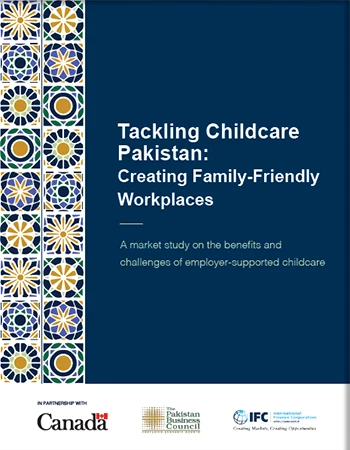A market study on the benefits and challenges of employer-supported childcare
Access to good quality, affordable childcare can positively impact women’s access to more and better jobs. In Pakistan, women perform more than 90 percent of all unpaid care work while women’s labor force participation rate stands at 23 percent, one of the lowest rates in the world (ILO 2019, 2020). Employer-supported childcare can supplement public provision and, along with other family-friendly policies such as paid leave, safe transportation, and flexible work arrangements, benefit women, children, businesses, and the economy.
This study, part of a collaboration between IFC and Pakistan Business Council, surveyed 140 private sector employers in Pakistan, in addition to interviewing working parents, policymakers, and childcare providers, to identify challenges and opportunities for expanding employer-supported childcare and other family-friendly policies in Pakistan. The study found, for example, that only 27 percent of employers surveyed offer some type of support to meet the childcare needs of employees, despite provincial regulations around the country mandating it. The good news is, however, that almost all employers offering this type of support report significant business benefits, including increased employee productivity, lower absenteeism and turnover, and increased profitability, as a result of their family-friendly initiatives.
Given the business case for employer-supported childcare and based on the key findings of this research, the report outlines recommended actions for employers, the public sector, childcare providers, and other stakeholders interested in creating family-friendly workplaces and advancing women’s employment in Pakistan. Among actions employers can take are assessing the childcare needs of their employees and considering multiple options for meeting their employees’ care needs. Support from the public sector, in the form of clear guidelines and incentives for employers, for example, can also contribute to making Pakistani workplaces more family-friendly.
Related Resources
- Tackling Childcare Pakistan: Creating Family-Friendly Workplaces — Insights from an IFC-PBC Peer-Learning Collaboration
- Presentation: Tackling Childcare Pakistan - Context, Research Methodology, Key Findings, and more
